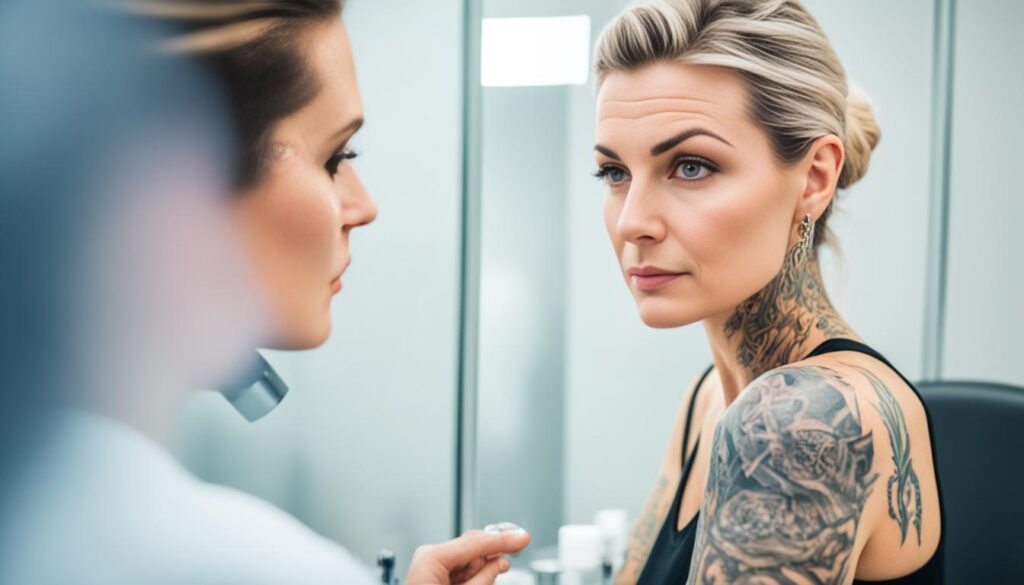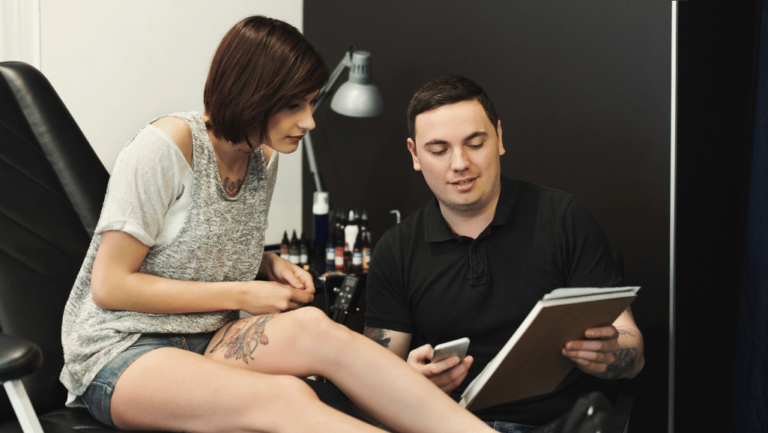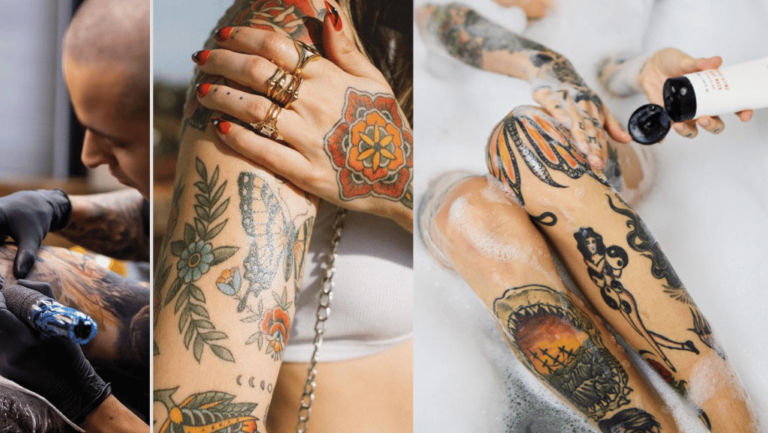Getting a tattoo can be a big decision with long-lasting consequences. While tattoos have become increasingly popular in recent years, there are some important reasons to consider before permanently marking your skin. Whether it’s the potential for regret, health concerns, or the impact on your personal and professional life, it’s essential to weigh the pros and cons before taking the plunge.
In this article, we will explore the various reasons why individuals may choose to avoid getting a tattoo. From the risks and health concerns associated with tattooing to the potential for regret and the availability of alternative options, we will provide an in-depth analysis of why some people decide to forgo tattoos.
By examining these reasons, you can make an informed decision that aligns with your personal preferences and values. So, let’s dive in and uncover the compelling reasons why you might consider saying “Why Not Tattoo”
Key Takeaways:
- Getting a tattoo of a partner’s name can lead to regret if the relationship ends.
- Tattooing carries various health risks, including allergic reactions and infections.
- Tattoo removal is an option, but complete removal may not always be possible.
- Careful aftercare is essential for the proper healing of a tattoo.
- Alternative options, such as temporary tattoos or henna art, offer a non-permanent alternative.
Tattoo Risks and Health Concerns “Why Not Tattoo”
Tattooing involves breaking the skin, which can lead to various health problems. It’s important to carefully consider the risks associated with tattoos before getting inked.
Some of the risks related to tattooing include:
- Allergic reactions to tattoo ink
- Skin infections
- Granulomas
- Keloids
In addition to these risks, there is also a potential for diseases to be spread through contaminated equipment used during the tattooing process. This includes bloodborne infections like hepatitis B and hepatitis C.
Considering the potential risks to your health is crucial before making the decision to get a tattoo. It’s important to ensure that you are well-informed and take the necessary precautions to minimize these risks.
| Risk | Description |
|---|---|
| Allergic reactions to tattoo ink | Some individuals may develop allergic reactions to the components in tattoo inks. This can lead to redness, itching, rashes, and even blistering at the tattoo site. |
| Skin infections | Tattooing involves puncturing the skin, which can introduce bacteria and other microorganisms. If proper hygiene and sterilization practices are not followed, this can lead to skin infections such as cellulitis or abscesses. |
| Granulomas | A granuloma is a type of localized inflammation that occurs in response to foreign objects or substances. Some individuals may develop granulomas at the tattoo site, which can cause nodules or bumps. |
| Keloids | Keloids are raised scars that extend beyond the boundaries of the original wound. They can occur at the site of a tattoo, particularly in individuals with a predisposition to keloid formation. |
| Diseases spread through contaminated equipment | If tattoo equipment is not properly sterilized or disposable equipment is not used, there is a risk of bloodborne infections being transmitted. This includes hepatitis B and hepatitis C, which can have serious long-term health consequences. |
Potential for Regret: Tattoo Removal Options

If you’re worried about tattoo regret in the future, it’s important to know that tattoo removal is an option. While complete removal may not always be possible and scars may remain, there are several tattoo removal options available to consider.
One popular method is laser removal. This technique uses high-intensity laser beams to break down the tattoo ink particles, allowing the body’s natural processes to gradually remove the ink. Laser removal is considered safe and effective, but multiple sessions may be required to achieve the desired results.
Another option is dermabrasion. Dermabrasion involves the use of a high-speed brush or wheel to remove the outer layers of the skin where the tattoo ink resides. This method can be effective for superficial tattoos, but it may cause some discomfort and require a longer healing period.
For larger or more complex tattoos, surgical excision may be recommended. This procedure involves cutting out the tattooed skin and stitching the surrounding skin back together. Surgical excision is typically used for small tattoos or when complete removal is desired, but it may result in more noticeable scarring.
Consult with a dermatologist to discuss the best approach for your specific tattoo and to understand the potential outcomes and risks associated with each tattoo removal option.
Comparing Tattoo Removal Options
| Tattoo Removal Method | Effectiveness | Scarring | Sessions Required |
|---|---|---|---|
| Laser Removal | High | Possible | Multiple |
| Dermabrasion | Variable | Possible | Multiple |
| Surgical Excision | High | Likely | One |
Tattoo Aftercare Tips
Proper aftercare is crucial to ensure the healing and longevity of a tattoo. Taking care of your new tattoo will help minimize the risk of infection and promote better healing. Here are some essential tattoo aftercare tips to follow:
Keep the tattooed area clean: Gently wash the tattooed area with mild soap and water to remove any debris or dirt. Avoid using harsh soaps or abrasive scrubbing, as these can irritate the skin.
Avoid direct streams of water: When washing the tattoo, avoid direct streams of water, such as showerheads or faucets. Instead, use a cupped hand or a gentle flow of water to rinse away the soap.
Apply a gentle moisturizer: After cleaning the tattooed area, pat it dry with a clean towel and then apply a thin layer of a gentle, fragrance-free moisturizer. This will help keep the skin hydrated and prevent excessive dryness or flaking.
Protect the tattoo from sun exposure: UV rays can fade and damage tattoos, so it’s important to keep your tattoo covered or apply a sunblock with a high SPF whenever it’s exposed to the sun.
Avoid swimming until fully healed: Submerging your tattoo in water can increase the risk of infection. Avoid swimming in pools, hot tubs, lakes, or the ocean until the tattoo has fully healed.
By following these tattoo aftercare tips, you can ensure the best possible healing process and help maintain the vibrancy of your tattoo for years to come.
Tattoo Alternatives

If you’re hesitant about getting a tattoo but still want a lasting symbol, there are plenty of alternative options to consider. These alternatives provide a way to express yourself without the commitment and potential regrets associated with permanent tattoos.
Temporary Tattoos
Temporary tattoos are a popular choice for those who want to try out different designs before committing to permanent ink. They come in a wide variety of styles, from realistic to whimsical, and can be easily applied and removed. With temporary tattoos, you can experiment with different designs and placements without the worry of a lifelong commitment.
Henna Art
Henna art, also known as mehndi, is a traditional form of body art that uses a natural dye made from the Henna plant. It creates intricate designs on the skin that can last for several weeks. Henna art is popular for its cultural significance and its temporary nature, allowing individuals to adorn their bodies with beautiful patterns without the permanence of a tattoo.
Body Painting
Body painting offers a unique way to express yourself artistically. Whether you want to showcase your creativity at a festival, event, or as a personal form of self-expression, body painting allows you to transform your body into a living canvas. Professional body painters can create stunning designs on your skin that can be washed off when you’re ready for a change.
Jewelry
If you want a subtle and versatile alternative to permanent tattoos, jewelry can be the perfect choice. Choose pieces that represent your desired design or symbol, such as pendants, earrings, or rings. Adorn yourself with meaningful jewelry that can be easily changed or removed, allowing you to personalize your style without the lifelong commitment of a permanent tattoo.
With these tattoo alternatives, you can confidently express yourself without the permanence of a tattoo. Whether you prefer temporary tattoos, henna art, body painting, or jewelry, there are plenty of options available to suit your style and preferences.
| Pros | Cons |
|---|---|
| Temporary tattoos allow for experimentation and flexibility. | Temporary tattoos may not have the same level of detail and longevity as permanent tattoos. |
| Henna art provides intricate and culturally significant designs. | Henna art fades over time and requires regular touch-ups for a fresh look. |
| Body painting offers a unique form of self-expression. | Body painting may not be as long-lasting as other alternatives and can smudge or wear off. |
| Jewelry allows for personalized style without the commitment. | Jewelry may not provide the same visual impact as a tattoo. |
Tattoo Consequences
When considering getting a tattoo, it’s crucial to think about the potential consequences that come with it. While tattoos can be a beautiful form of self-expression, it’s essential to weigh the long-term impact they can have on various aspects of life.
Career Implications
One of the key factors to consider is the potential impact on your career. While tattoos have become more accepted in many industries, certain professions may still have strict rules and regulations regarding visible tattoos. Jobs in fields like law, finance, or customer-facing roles may require you to cover up your tattoos, which can limit your clothing choices or even affect your chances of landing certain positions.
Social Perceptions
Another consideration is the way tattoos are perceived socially. While opinions on tattoos have evolved over the years, some people still hold negative stereotypes and judgments towards individuals with visible tattoos. This can lead to discrimination, prejudice, or even exclusion in certain social settings. It’s important to be aware of these potential social consequences and decide whether you are comfortable facing them.
Personal Preferences
Lastly, it’s essential to consider your personal preferences regarding tattoos. While tattoos can be a source of pride and joy for many, they can also bring about feelings of regret or dissatisfaction in some individuals. Your tastes and preferences may change over time, and what may seem like a great idea now might not hold the same significance for you in the future. Tattoo removal can be costly, time-consuming, and might not always yield perfect results. Taking the time to reflect on your personal preferences and ensuring that a tattoo aligns with your long-term vision for yourself is an important step.
Considering and weighing these potential consequences can help you make an informed decision about getting a tattoo. Remember, tattoos are a permanent form of body art, and it’s important to think carefully before making a choice that could have lasting effects on your career, social interactions, and personal well-being.
| Consequence | Description |
|---|---|
| Career Implications | Limited job prospects in certain fields where visible tattoos are not accepted. |
| Social Perceptions | Potential discrimination or negative judgments from individuals who hold stereotypes towards tattoos. |
| Personal Preferences | Potential feelings of regret or dissatisfaction if personal tastes and preferences change over time. |
Seeking Professional Tattoo Artists
When considering getting a tattoo, it’s crucial to choose a reputable and professional tattoo artist. Look for artists who have been properly trained and work in studios that follow safety protocols and guidelines. Ensure that the artist uses sterile equipment, wears gloves, and uses new disposable needles and ink cups. This will help minimize the risk of infections and other complications.
Why Choose Professional Tattoo Artists?
Professional tattoo artists undergo extensive training to ensure they have the necessary skills to create high-quality tattoos. They have a deep understanding of different tattoo techniques, styles, and designs, allowing them to bring your vision to life. Additionally, professional artists prioritize safety and hygiene, providing you with a safe and clean environment for your tattooing experience.
Professional tattoo artists also have a portfolio of their work, giving you the opportunity to see their artistic abilities and find an artist whose style aligns with your preferences. They can provide valuable insights and advice on placement, sizing, and design customization, helping you make informed decisions about your tattoo.
Choosing a Reputable Tattoo Studio
When choosing a tattoo artist, it’s essential to select a reputable studio that follows safety protocols and guidelines. Look for studios that have a clean and welcoming environment, with proper sterilization practices in place. Here are some key factors to consider:
- Studio cleanliness: Ensure the studio is clean and well-maintained. The tattooing area should be sanitized between clients, and all equipment should be properly sterilized.
- Licensing and certifications: Verify that the studio and artists have the necessary licenses and certifications required by local health authorities.
- Artist portfolios: Take the time to review the artists’ portfolios to assess their skills and style. Look for consistent quality, attention to detail, and versatility in their work.
- Client reviews: Read reviews and testimonials from previous clients to gauge their satisfaction with the studio and artist.
Benefits of Choosing Professional Tattoo Artists
Opting for professional tattoo artists offers several benefits:
- Quality and longevity: Professional artists use high-quality tattoo ink, ensuring vibrant colors and longevity. They also have a deep understanding of tattoo placement, ensuring your tattoo ages well and maintains its integrity.
- Safe tattooing practices: Professional artists prioritize safety and follow strict hygiene practices. Their commitment to sterile techniques minimizes the risk of infections and other complications.
- Customization and creativity: Professional artists have the experience and expertise to bring your ideas to life. They can offer suggestions and work with you to create a unique and personalized design.
By choosing professional tattoo artists, you can have peace of mind knowing that your tattoo experience will be safe, professional, and tailored to your vision.
Conclusion
While tattoos can be a form of self-expression, it’s important to carefully consider the risks and potential consequences before getting inked. Tattoo risks, including allergic reactions and infections, should not be taken lightly. Additionally, the potential for tattoo regret is a valid concern. Fortunately, there are tattoo removal options available for those who change their mind in the future. It’s important to remember that complete removal may not always be possible and scars may remain.
If you’re hesitant about a permanent commitment, exploring tattoo alternatives can provide a solution. Temporary tattoos, henna art, body painting, or jewelry can still express your desired design without the long-term implications. By weighing the tattoo consequences and understanding the potential health concerns, individuals can make informed choices when it comes to body art.
When deciding to get a tattoo, it’s crucial to seek professional tattoo artists who follow safety protocols and guidelines. Reputable artists use sterile equipment and disposable needles, minimizing the risk of infections and other complications. Taking these precautions ensures a safer tattoo experience.
FAQ
Why should I avoid getting a tattoo?
What are the risks and health concerns associated with tattoos?
How can I remove a tattoo if I regret getting it?
What are some aftercare tips for maintaining a tattoo’s health?
Are there alternatives to permanent tattoos?
What are the potential consequences of getting a tattoo?
How can I ensure I choose a reputable tattoo artist?
Forhad
Forhad's writing is not just about the artistry of tattoos or the latest trends in the industry; it's an exploration of the deep-rooted connections people have with their tattoos, reflecting personal narratives, cultural histories, and moments of transformation. Through a mix of in-depth features, personal narratives, and insightful analyses, he sheds light on the multifaceted nature of tattooing, revealing the emotional and cultural layers that lie beneath the surface.


















